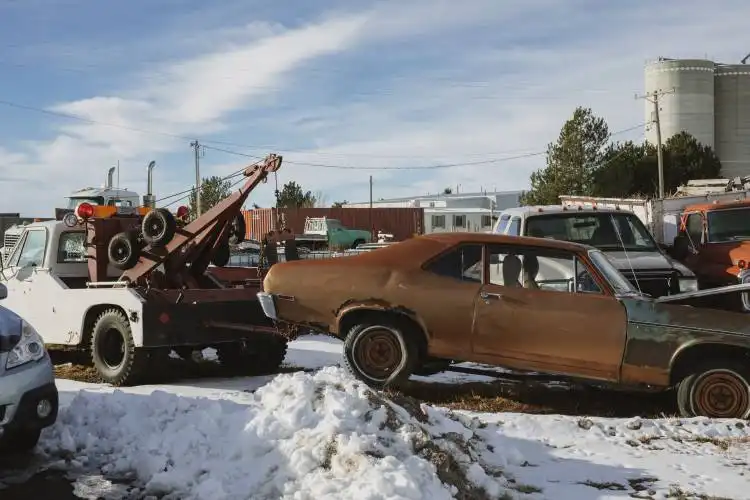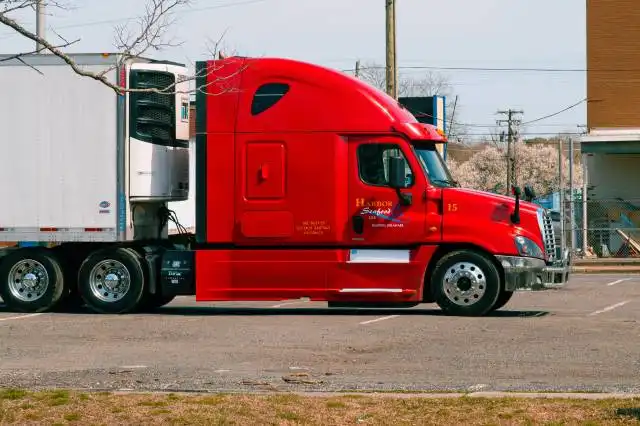Start a Trucking Company
Revving Up Your Empire: The Exciting Journey of Running a Trucking Business
| Updated


TRUCKING COMPANY
Buckle up, aspiring entrepreneurs, and get ready to embark on a journey with a trucking company business! This venture isn't all honk honk and highway trips; it involves meticulously managing fleets, ensuring on-time deliveries and navigating logistical intricacies. This type of business hauls goods across the country, playing the integral role of the circulatory system in the body of commerce. In essence, your trucks will become the charismatic metal beasts that connect industries and keep the heartbeat of the economy thumping!
Jump to Business Plan
RELATED BUSINESS IDEAS
Browse ALL Cars & Transportation Solutions Business Ideas
Discover Your Perfect Domain
Unlock the door to your online success with our hand-picked selection of premium domain names. Whether you're starting a new venture or rebranding an existing one, the right domain can set the tone for your digital presence. Browse through our curated list, each with its unique potential to enhance your brand's visibility and credibility.
TRUCKING MINI BUSINESS PLAN
This a quick reality check to help you identify the strengths and weaknesses of your business concept before you dive in.
Expected Percent Margin:
- Gross Margin: 10-20%
- Net Profit Margin: 5-10%
Earnings Expectations:
- Daily Earnings: $350 - $700 per truck
- Weekly Earnings: $1,750 - $3,500 per truck
- Monthly Earnings: $7,500 - $15,000 per truck
- Annual Earnings: $90,000 - $180,000 per truck
Actions to Hit Those Numbers:
Fleet Procurement and Management:
- Initial Investment: At least $150,000-$200,000 for a modern, fuel-efficient truck
- Maintenance: Regular servicing and maintenance to prevent unexpected breakdowns and loss of business.
Driver Recruitment and Retention:
- Hiring: Two drivers per truck to maximize utilization and ensure safety.
- Retention: Competitive salaries, benefits, and good working conditions to retain drivers.
Route Planning and Optimization:
- Efficiency Planning: Optimize routes for fuel efficiency and quick delivery times.
- Contract Acquisition: Secure long-term shipping contracts with businesses for steady income.
Marketing and Customer Acquisition:
- Brand Reputation: Maintain high standards of service to enhance brand reputation and secure repeat business.
- Sales Strategy: Reach out to potential clients and businesses in need of regular shipping services.
Cost Control:
- Fuel Expenses: Careful monitoring and optimization of fuel consumption, largest variable expense in trucking industry.
- Insurance and Licenses: Budget for regular insurance premium payments and renewal of trucking licenses.
Business Operations:
- Operation Time: 24/7 operations to maximize truck utilization and revenue generation.
These are generalized estimations and can vary depending on location, economic conditions, number of trucks, and individual business strategies. Always consult with a financial advisor for personalized advice.
NOT WHAT YOU HAD IN MIND? Here are more ideas



Browse ALL Cars & Transportation Solutions Business Ideas
Grab Your Business Website Name
Before you get caught up in the whirlwind of setting up your business, invest in a domain name. It's a small but significant step that lays the foundation for your brand and makes it easier for customers to find and trust you. Just like you wouldn't build a house without securing the land first, don't build a business without securing your domain name.
"Why? Can't that wait?" Here's why it shouldn't
Step 1: Determine if Starting a Trucking Company is Right for You
Breakdown of Startup Expenses
Before starting a trucking business, it is important to understand the startup costs associated with the venture. These costs can include the purchase of a truck, insurance, licensing fees, and any other necessary equipment. Additionally, it is important to consider the cost of fuel, maintenance, and any other ongoing costs that may be associated with running a trucking business. It is important to calculate these costs and make sure that the business can be profitable and sustainable.
Breakdown of Ongoing Expenses
In addition to the startup costs, it is important to consider the ongoing costs associated with running a trucking business. These costs can include fuel, maintenance, insurance, licensing fees, and any other necessary equipment. Additionally, it is important to consider the cost of hiring and training drivers, as well as any other costs associated with running a trucking business. It is important to calculate these costs and make sure that the business can be profitable and sustainable.
Examples of Ways to Make Money
There are a variety of ways to make money in the trucking business. Some of the most common ways to make money include hauling freight, providing transportation services, and providing delivery services. Additionally, some trucking businesses may also provide specialized services such as hazardous material transportation, refrigerated transportation, or flatbed transportation. It is important to research the different types of services that can be offered and determine which services will be the most profitable for the business.
Step 2: Name the Business
Naming a business is an important step in the process of starting a trucking company. It is important to choose a name that is memorable and reflects the company’s mission. It is also important to make sure the name is not already in use by another business. To make sure the name is available, it is important to check with the state’s Secretary of State office to make sure the name is not already in use. Additionally, it is important to check with the U.S. Patent and Trademark Office to make sure the name is not trademarked.
When choosing a name, it is important to consider the company’s mission and values. The name should reflect the company’s goals and values. It is also important to consider the target audience. The name should be easy to remember and should be something that resonates with the target audience. Additionally, it is important to consider the company’s location. If the company is located in a certain city or state, it may be beneficial to include the location in the name.
When choosing a name, it is important to keep it simple and avoid overly complicated words. Additionally, it is important to avoid using words that could be confused with other businesses. It is also important to avoid using words that could be offensive or have negative connotations.
Once the name is chosen, it is important to register the business with the state. This will ensure that the name is legally protected and that the business is in compliance with all state laws. Additionally, it is important to register the business with the IRS to ensure that the business is in compliance with all federal laws.
Finally, it is important to create a logo and website for the business. This will help to create a professional image and will make the business more recognizable. Additionally, it will help to create a sense of trust and credibility with potential customers.
Step 3: Obtain the Necessary Licenses and Permits
and Permits
Federal Motor Carrier Safety Administration (FMCSA)
The Federal Motor Carrier Safety Administration (FMCSA) is a branch of the United States Department of Transportation (USDOT). It is responsible for regulating the trucking industry and ensuring that truckers comply with federal laws and regulations. To start a trucking company, you must first obtain a USDOT number and register with the FMCSA. This will allow you to legally operate a trucking business in the United States. Additionally, you must obtain a Motor Carrier Identification Number (MCIN) from the FMCSA. This number is used to identify your business and is required for filing taxes and other legal paperwork.
State Licenses and Permits
In addition to the federal requirements, you must also obtain the necessary state licenses and permits. Depending on the state, you may need to obtain a business license, a commercial driver's license, and other permits. You may also need to register your business with the state's Department of Motor Vehicles. Additionally, you may need to obtain a hazardous materials endorsement if you plan to transport hazardous materials. It is important to research the specific requirements for your state to ensure that you have all the necessary licenses and permits.
Step 4: Purchase the Necessary Equipment
Trucks
When starting a trucking company, the most important piece of equipment is the truck. It is important to research the different types of trucks available and determine which type is best for the business. Consider the size, fuel efficiency, and cost of the truck. It is also important to consider the maintenance and repair costs associated with the truck. Additionally, consider the cost of insurance for the truck and any additional safety features that may be necessary.
Trailers
In addition to the truck, it is important to purchase the necessary trailers for the business. Consider the size, weight, and cost of the trailers. It is important to make sure the trailers are compatible with the truck and can be safely and securely attached. Additionally, consider the cost of maintenance and repair for the trailers.
Other Equipment
In addition to the truck and trailer, there are other pieces of equipment that may be necessary for the business. Consider the cost of a GPS system, communication equipment, and other safety equipment. It is important to research the different types of equipment available and determine which is best for the business. Additionally, consider the cost of maintenance and repair for the equipment.
Step 5: Obtain Insurance
Liability Insurance
Liability insurance is an important part of starting a trucking business. It will protect you from any legal claims that may arise from accidents or other incidents. Liability insurance can be expensive, so it's important to shop around and compare rates from different providers. Make sure to read the fine print and understand the coverage you are getting. It's also important to make sure the insurance covers any vehicles you may be using, such as trailers or other equipment.
Cargo Insurance
Cargo insurance is another important form of insurance for a trucking business. It will cover any losses that may occur while transporting goods. This includes damage to the goods, theft, or any other losses that may occur. Cargo insurance can be expensive, so it's important to shop around and compare rates from different providers. Make sure to read the fine print and understand the coverage you are getting. It's also important to make sure the insurance covers any vehicles you may be using, such as trailers or other equipment. Additionally, consider any special coverage you may need, such as hazardous materials or refrigerated goods.
Step 6: Set Up Accounting and Bookkeeping
Accounting Software
Accounting software is a must for any business, and especially for a trucking company. It will help you keep track of your expenses, income, and other financial information. It will also provide you with the ability to generate reports and analyze your financial data. When selecting accounting software, make sure it is compatible with the type of trucking business you will be running. It should also be able to integrate with other software programs you may be using, such as payroll and invoicing. Additionally, you should make sure the software is user-friendly and easy to use.
Bookkeeping Services
Bookkeeping services are essential for any business, and especially for a trucking company. Bookkeeping services will help you keep track of your expenses, income, and other financial information. They will also provide you with the ability to generate reports and analyze your financial data. When selecting a bookkeeping service, make sure they are experienced in working with trucking businesses. Additionally, you should make sure the bookkeeping service is reliable and trustworthy. It is also important to find a bookkeeping service that is affordable and provides excellent customer service. Finally, you should make sure the bookkeeping service is able to integrate with other software programs you may be using, such as payroll and invoicing.
Step 7: Hire Drivers
Qualifications
When hiring drivers, it is important to make sure they meet the qualifications required by the state and federal regulations. This includes having a valid driver's license, a clean driving record, and a good knowledge of the rules of the road. Additionally, it is important to make sure that the drivers have the necessary skills and experience to safely operate the vehicles. It is also important to make sure that the drivers have the necessary medical certifications, such as a physical exam and drug test.
Training
Once the drivers have been hired, it is important to provide them with the necessary training. This includes teaching them the rules of the road, how to properly operate the vehicles, and how to safely load and unload cargo. Additionally, it is important to provide the drivers with the necessary safety training, such as how to properly inspect the vehicles, how to properly secure cargo, and how to properly handle hazardous materials. It is also important to provide the drivers with the necessary customer service training, such as how to properly interact with customers and how to properly handle customer complaints.
Step 8: Market Your Business
Advertising is a great way to get the word out about your trucking business. You can create a website, use social media, and create print materials such as flyers and business cards. You can also use traditional advertising methods such as radio and television commercials. Make sure to include your contact information in all of your advertising materials.
Networking is also an important part of marketing your trucking business. Attend local business events and join local business organizations. You can also reach out to other trucking companies and form partnerships. This will help to increase your customer base and get your business more exposure.
In addition, you can offer discounts and promotions to attract new customers. You can also offer referral programs to existing customers to encourage them to spread the word about your business. Finally, you can create a loyalty program to reward customers for their continued business.
Step 9: Develop a Business Plan
Goals
Establishing goals is an important part of any business plan. Goals should be specific, measurable, achievable, realistic, and timely. It is important to set goals that are challenging yet attainable. Goals should also be measurable so that progress can be tracked and evaluated. Additionally, goals should be realistic and achievable within the timeframe set.
Strategies
Strategies are the steps taken to achieve the goals set out in the business plan. It is important to develop strategies that are tailored to the business and the industry. Strategies should include a marketing plan, a financial plan, and a plan for managing employees and operations. Additionally, strategies should be flexible and able to adapt to changing market conditions. It is also important to consider the resources and capabilities of the business when developing strategies.
EXPLORE MORE CATEGORIES
Browse ALL Business Idea Categories
TAKE THE NEXT STEPS










